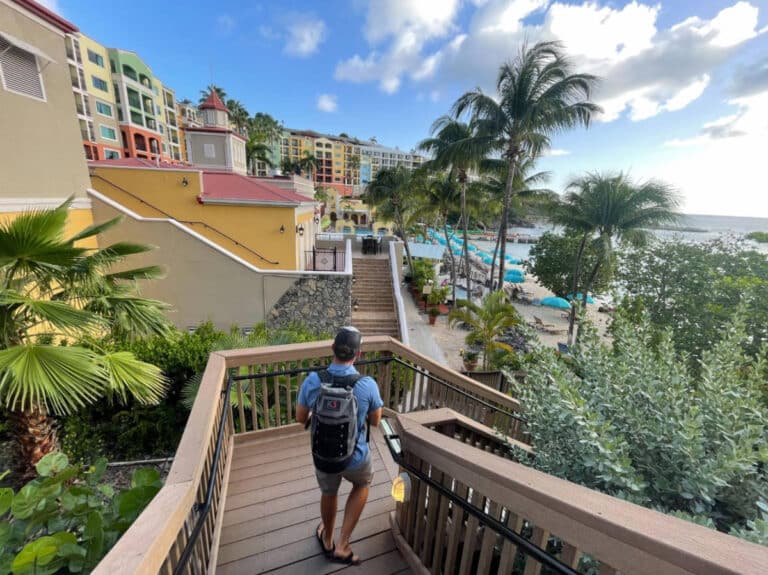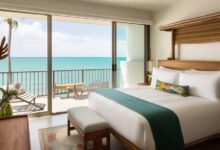Cost of living in the British Virgin Islands compared to other Caribbean islands
Cost of living in the British Virgin Islands compared to other Caribbean islands is a complex issue, influenced by factors ranging from geographical location and import reliance to local economic conditions and tourism. This analysis delves into a comparative study, examining key aspects such as housing, food, transportation, utilities, healthcare, entertainment, and taxes across the British Virgin Islands and several other Caribbean islands.
Understanding these cost differences is crucial for anyone considering relocation, investment, or simply curious about the financial realities of life in these idyllic locations.
The following sections will provide a detailed breakdown of these expenses, offering insights into the relative affordability and challenges of living in each location. We’ll explore the nuances of each cost category, highlighting both similarities and significant discrepancies. By comparing data across multiple islands, we aim to provide a comprehensive and informative overview to assist in informed decision-making.
Housing Costs
Housing costs in the British Virgin Islands (BVI) are significantly higher than in many other Caribbean islands, reflecting the territory’s limited land area, high demand, and exclusive tourism sector. Understanding these differences is crucial for anyone considering relocating or investing in property in the region. This section will delve into a comparison of housing costs in the BVI with those in Barbados, Jamaica, and the Bahamas, exploring factors that influence these prices and the variety of housing options available.
Average Rental Prices in the BVI and Other Caribbean Islands
The rental market in the BVI, Barbados, Jamaica, and the Bahamas presents a diverse range of options, impacting costs considerably. The following table offers a generalized comparison, keeping in mind that prices can fluctuate widely based on specific location, property condition, and amenities. It’s important to consult local real estate agents for the most up-to-date information.
| Island | Apartment Rental (Average) | House Rental (Average) | Notes on Housing Market Conditions |
|---|---|---|---|
| British Virgin Islands | $1500 – $5000+ USD per month | $3000 – $15000+ USD per month | High demand, limited supply, luxury properties dominate the market. Seasonal fluctuations are significant. |
| Barbados | $800 – $3000 USD per month | $1500 – $8000 USD per month | More varied options available, with a range catering to different budgets. Competition is present but less intense than in the BVI. |
| Jamaica | $500 – $2000 USD per month | $1000 – $5000 USD per month | Generally more affordable than the BVI or Barbados, with a wider range of properties available across different price points. |
| Bahamas | $1000 – $4000 USD per month | $2500 – $10000+ USD per month | Similar to Barbados in terms of market diversity, but with higher prices in prime locations. |
Factors Influencing Housing Costs in the BVI
Several key factors contribute to the higher housing costs observed in the BVI. Location plays a significant role, with properties in desirable areas like Tortola’s waterfront communities commanding premium prices. The type of property, whether a luxury villa, a condo, or a smaller apartment, also greatly impacts cost. Finally, amenities such as private pools, ocean views, and proximity to beaches add considerably to rental or purchase prices.
The limited land availability further exacerbates the high demand and subsequently pushes prices upwards.
The British Virgin Islands boast a higher cost of living than many other Caribbean islands, a factor to consider when planning a trip. This is especially true when factoring in the cost of travel, where you need to be aware of hidden fees and extra charges on luxury flights to avoid to keep your overall expenses manageable.
Therefore, budgeting for flights to the BVI requires careful attention to detail to avoid unexpected increases in the overall cost of your holiday.
Availability of Housing Options in the BVI and Other Caribbean Islands
The BVI offers a range of housing options, but the availability of affordable housing is limited. Luxury villas and high-end condominiums dominate the market, reflecting the territory’s focus on high-end tourism. In contrast, Jamaica and Barbados offer a broader spectrum of housing choices, catering to a wider range of budgets and preferences. The Bahamas presents a middle ground, with a mix of luxury properties and more moderately priced options, but generally at a higher price point than Jamaica.
The variety of housing options directly correlates with the overall affordability and competitiveness of the rental and purchase markets in each location.
Food and Groceries
The cost of food and groceries in the British Virgin Islands (BVI) is significantly higher than in many other Caribbean islands. This is primarily due to the islands’ heavy reliance on imported goods and the limited scope of local agriculture. Understanding the nuances of food pricing in the BVI requires examining both import costs and the impact of local production (or lack thereof).
Grocery Prices Compared Across Caribbean Islands
The following table compares the average prices of several staple grocery items across the BVI, Jamaica, Barbados, and Puerto Rico. It’s important to note that prices can fluctuate based on seasonality, specific retailer, and brand. These figures represent approximate averages gathered from various online sources and anecdotal evidence in late 2023. More rigorous research would be needed for definitive conclusions.
| Item | BVI (USD) | Jamaica (USD) | Barbados (USD) | Puerto Rico (USD) |
|---|---|---|---|---|
| Loaf of Bread | $3.50 | $2.00 | $2.50 | $2.80 |
| 1 Gallon Milk | $6.00 | $4.50 | $5.00 | $5.50 |
| 5lb Bag of Rice | $8.00 | $5.00 | $6.00 | $6.50 |
| 1lb Ground Beef | $8.00 | $5.50 | $6.50 | $7.00 |
| 1 dozen Eggs | $4.50 | $3.00 | $3.50 | $4.00 |
| 1lb Chicken Breast | $7.00 | $4.00 | $5.00 | $6.00 |
| 1lb Onions | $3.00 | $1.50 | $2.00 | $2.50 |
Impact of Import Costs and Local Production
The BVI’s high reliance on imported food significantly impacts grocery prices. The cost of transportation, import duties, and handling fees all contribute to inflated prices at the retail level. Limited local agricultural production further exacerbates the issue. While some local farmers cultivate fruits and vegetables, their output is insufficient to meet the demand of the islands’ population, necessitating a heavy dependence on imports.
This contrasts with islands like Jamaica, which have more established agricultural sectors, resulting in lower costs for certain produce.
Cost-Saving Strategies Employed by BVI Residents
BVI residents employ various strategies to mitigate high grocery costs. These include shopping at smaller, locally-owned stores that sometimes offer slightly lower prices than larger supermarkets, buying in bulk when possible to reduce per-unit costs, and utilizing seasonal produce when it’s available at lower prices. Many residents also grow their own herbs and vegetables in home gardens or community plots, mirroring cost-saving strategies employed throughout the Caribbean, where homegrown food supplements diets and reduces reliance on expensive market produce.
Another strategy, common across the Caribbean, involves prioritizing less expensive protein sources, such as beans and lentils, over more costly meats.
Transportation
Transportation in the British Virgin Islands (BVI) presents a unique set of challenges and costs compared to other Caribbean islands, significantly impacting the overall cost of living. The archipelago’s geography, with its numerous islands and limited land area, necessitates reliance on various modes of transport, each with its own price tag and limitations. This section will explore the different transportation options available in the BVI and compare them to those found elsewhere in the Caribbean.Transportation Costs in the BVI and Other Caribbean Islands
- Car Ownership: Owning a car in the BVI is significantly more expensive than in many other Caribbean islands. The import duties on vehicles are high, leading to inflated prices for both new and used cars. Furthermore, fuel costs tend to be higher in the BVI than in some larger islands with more established fuel distribution networks. Regular maintenance can also be costly due to limited access to specialized parts and mechanics.
In contrast, islands like Barbados or Jamaica often have lower import duties and more competitive fuel pricing, making car ownership comparatively more affordable.
- Public Transportation: Public transportation in the BVI is limited, primarily consisting of infrequent and often unreliable bus services on the main islands. This lack of readily available and affordable public transport necessitates reliance on taxis or private vehicles, which further increases transportation costs. Many other Caribbean islands boast more extensive and affordable bus networks, providing a more accessible and cost-effective alternative to private car ownership.
The British Virgin Islands boast a higher cost of living than many other Caribbean islands, a fact often overlooked when planning a trip. However, if you’re considering a luxurious getaway, the expense might be worth it; after all, you’ll likely arrive via one of the top luxury airlines with best in-flight entertainment , making the journey itself a treat.
Ultimately, the decision hinges on balancing your budget with your desired level of comfort and travel experience in the BVI.
- Taxis: Taxi fares in the BVI are generally higher than in many other Caribbean destinations. This is partly due to the limited public transport options and the distances between islands requiring boat transfers, adding to the overall cost. While taxis provide a convenient option, frequent use can quickly become expensive, impacting the household budget significantly. Islands with robust public transit systems usually offer more competitive taxi fares.
The British Virgin Islands boast a higher cost of living than many other Caribbean islands, particularly when considering imported goods. Planning a trip requires considering this, especially if you’re flying from afar; researching options like the best luxury airlines for long haul flights to asia might be worthwhile depending on your budget, as the flight itself can represent a significant portion of your overall expenses.
Ultimately, the cost of living in the BVI, relative to other islands, needs careful consideration before committing to a visit.
Challenges of Transportation in the BVI and Their Impact on Cost of LivingThe BVI’s unique geography and limited infrastructure present several transportation challenges directly impacting the cost of living. The dispersed nature of the islands necessitates the use of ferries or water taxis for inter-island travel, adding considerable expense to daily commutes or essential trips. The lack of a comprehensive and reliable public transport system forces residents to rely heavily on private vehicles or expensive taxis, increasing transportation costs significantly.
This reliance on private transport leads to increased fuel consumption and higher maintenance costs, ultimately impacting the affordability of living in the BVI.Modes of Transportation in the BVI and Other Islands: Affordability and Convenience
- Private Vehicles: While convenient, private vehicle ownership is expensive in the BVI due to high import duties and fuel costs. This contrasts with some other Caribbean islands where car ownership is more accessible.
- Public Buses: The limited bus network in the BVI restricts its usefulness, particularly for those living outside major towns. Other Caribbean islands often provide more extensive and affordable bus services.
- Water Taxis and Ferries: Essential for inter-island travel in the BVI, these services can be expensive, particularly for frequent users. While some other islands also rely on ferries, the frequency and cost may vary greatly.
- Taxis: While convenient, taxis in the BVI are relatively expensive compared to many other islands due to limited competition and the need for water transport in some cases.
Utilities

Source: travellemming.com
The British Virgin Islands boast a higher cost of living than many other Caribbean islands, a fact often overlooked when considering relocation. This is especially true if you factor in travel costs; for instance, figuring out how much does a first class flight on emirates cost can significantly impact your budget. Therefore, prospective residents should carefully weigh these expenses against the overall lifestyle offered in the BVI.
Utility costs in the British Virgin Islands (BVI), like many Caribbean islands, are a significant aspect of the cost of living. Understanding these costs and how they compare to other islands requires examining electricity, water, and internet services individually, considering factors influencing price variations. While precise figures fluctuate, a general comparison provides a useful overview.The cost of utilities in the BVI and across the Caribbean is influenced by a number of interconnected factors.
The British Virgin Islands boast a higher cost of living than many other Caribbean islands, particularly when considering luxury goods and services. Planning a trip there often involves significant airfare; therefore, carefully reviewing tips for choosing the perfect luxury flight for your trip is crucial for budgeting. This careful planning helps mitigate the overall expense of your BVI getaway, allowing you to enjoy the islands without excessive financial strain.
These include the island’s reliance on imported fuels (particularly for electricity generation), the efficiency of the local utility infrastructure, government regulations and subsidies, and the level of competition in the market. Islands with robust renewable energy sources or more efficient power grids tend to have lower electricity costs. Similarly, access to reliable freshwater sources impacts water costs, while the level of internet infrastructure development influences internet pricing.
Electricity Costs
Electricity costs in the BVI are generally considered higher than the average across the Caribbean. This is largely due to the territory’s dependence on imported fossil fuels for electricity generation. Many Caribbean islands are similarly reliant on imports, but factors like the scale of operations and the presence of renewable energy initiatives create variations. For instance, some islands with significant geothermal or solar energy projects enjoy lower electricity rates.
| Island | Average Monthly Cost (USD) |
|---|---|
| British Virgin Islands | $200 – $300 (estimate for average household) |
| Barbados | $150 – $250 (estimate for average household) |
| Jamaica | $100 – $200 (estimate for average household) |
| Dominican Republic | $80 – $150 (estimate for average household) |
Note: These figures are estimates and can vary significantly depending on consumption levels and specific utility providers.
Water Costs
Water costs in the BVI, while not exceptionally high compared to some other Caribbean islands, are still a notable expense. The cost is influenced by factors such as water scarcity, desalination processes (common in many islands with limited freshwater resources), and the efficiency of water distribution networks. Islands with abundant rainfall or effective water management systems tend to have lower water bills.
| Island | Average Monthly Cost (USD) |
|---|---|
| British Virgin Islands | $50 – $100 (estimate for average household) |
| Barbados | $40 – $80 (estimate for average household) |
| Jamaica | $30 – $60 (estimate for average household) |
| Dominican Republic | $20 – $40 (estimate for average household) |
Note: These figures are estimates and can vary significantly depending on consumption levels and specific utility providers.
Internet Costs
Internet costs in the BVI are comparable to other Caribbean islands, although speeds and reliability can vary. The cost is primarily affected by the level of infrastructure development, the availability of fiber optic cables, and the level of competition among internet service providers. Islands with more advanced infrastructure generally offer faster and more affordable internet access.
| Island | Average Monthly Cost (USD) for Broadband |
|---|---|
| British Virgin Islands | $75 – $150 (depending on speed and provider) |
| Barbados | $60 – $120 (depending on speed and provider) |
| Jamaica | $50 – $100 (depending on speed and provider) |
| Dominican Republic | $40 – $80 (depending on speed and provider) |
Note: These figures are estimates and can vary significantly depending on speed and data allowance.
Government Subsidies and Incentives
Government subsidies and incentives related to utilities vary considerably across Caribbean islands. Some governments offer programs to encourage energy efficiency, support the adoption of renewable energy sources, or provide assistance to low-income households with utility bills. The BVI government has implemented some initiatives aimed at promoting energy efficiency, but comprehensive subsidies are less common compared to some other islands in the region.
Specific programs and their availability are subject to change and should be verified through official government channels.
Healthcare
Healthcare in the British Virgin Islands (BVI) presents a unique landscape compared to other Caribbean islands, blending aspects of both developed and developing healthcare systems. The cost of healthcare, availability of facilities, and insurance options all play significant roles in shaping the overall experience. Understanding these factors is crucial for anyone considering living or visiting the BVI.Healthcare Costs in the BVI and Other Caribbean Islands
The British Virgin Islands boast a higher cost of living than many other Caribbean islands, largely due to import reliance. However, if you’re considering a luxurious escape, the expense might be worth it; after all, it’s easy to justify the price when considering what are the best amenities on luxury flights to get there.
Ultimately, the cost of living in the BVI reflects its exclusive appeal and high-end lifestyle.
Public vs. Private Healthcare Costs
The BVI possesses a public healthcare system, though it is often supplemented by private options. Public healthcare is generally more affordable, but may have longer wait times and limited specialized services. Private healthcare offers faster access to care and a wider range of specialists, but comes with significantly higher costs. This is a common trend across the Caribbean, though the degree of cost difference varies considerably between islands.
Larger islands with more developed economies, such as Barbados or Puerto Rico, often have more robust private healthcare sectors with higher associated costs. Smaller islands, like many in the Eastern Caribbean, may have more limited private options and comparatively lower costs, although access to specialized care may be reduced.
- Common Medical Procedures: A simple consultation might cost significantly less in the BVI’s public system compared to private clinics, or even compared to private clinics in larger Caribbean islands. However, complex surgeries or specialized treatments like oncology or cardiology will likely be substantially more expensive in the BVI’s private sector, potentially comparable to costs in more developed Caribbean nations.
- Prescription Medications: The cost of prescription drugs can vary depending on the medication and whether it is sourced locally or imported. Generic medications are generally cheaper than brand-name drugs, a consistent pattern across the Caribbean.
- Emergency Room Visits: Emergency room costs in the BVI, especially in private facilities, can be significantly high compared to the public system, similar to trends in other Caribbean nations. The level of insurance coverage greatly impacts the final out-of-pocket expense.
Healthcare Facilities and Specialist Availability
The BVI has a primary healthcare system with several clinics and a main hospital, Peebles Hospital. While Peebles Hospital provides essential services, its capacity for specialized care is limited. For more advanced treatments, residents often travel to Puerto Rico, the US mainland, or other Caribbean islands with more comprehensive medical facilities. This contrasts with larger Caribbean islands, such as Jamaica or Trinidad and Tobago, which have a wider array of specialized hospitals and medical centers, offering a broader range of specialists and advanced treatments within their borders.
Health Insurance Options and Costs
Health insurance is crucial in the BVI, given the cost of private healthcare. Several private health insurance providers operate in the BVI, offering varying levels of coverage and premiums. The cost of insurance depends on the level of coverage chosen, age, pre-existing conditions, and other factors. Many employers provide health insurance as part of employee benefits packages.
Similar to the BVI, other Caribbean islands offer a range of private health insurance options, with costs generally increasing with the comprehensiveness of coverage and the island’s overall cost of living. Some islands may have government-sponsored health insurance programs to supplement private insurance or provide basic coverage for low-income residents. However, these programs vary significantly in scope and availability across the region.
Entertainment and Leisure
The cost of entertainment and leisure in the British Virgin Islands (BVI) is generally higher than in some other Caribbean islands, but lower than in others, reflecting a mix of factors including tourism levels, import costs, and the overall economic landscape. While the BVI offers a luxurious and exclusive experience, budget-conscious travelers can still find affordable options, albeit with some careful planning.
This section compares the costs of various entertainment activities in the BVI with those in other popular Caribbean destinations.
Comparison of Entertainment Costs Across Caribbean Islands
The price of entertainment varies significantly across Caribbean islands, influenced by factors like local economies, import duties, and the level of tourism development. Generally, islands with higher tourism density tend to have higher entertainment costs. The following table offers a comparative overview, acknowledging that prices fluctuate seasonally and can vary depending on location and establishment.
| Activity | BVI (USD) | Barbados (USD) | Jamaica (USD) | Dominican Republic (USD) |
|---|---|---|---|---|
| Dinner for two at a mid-range restaurant | 100-150 | 80-120 | 60-100 | 40-80 |
| Movie tickets (per person) | 15-20 | 12-18 | 8-12 | 5-10 |
| Cocktail at a beach bar | 15-20 | 10-15 | 8-12 | 5-8 |
| Snorkeling tour (per person) | 75-125 | 60-100 | 40-70 | 30-60 |
| Entry to a national park | 10-20 | 5-15 | 5-10 | 3-8 |
Note: These prices are estimates and can vary based on the specific location, season, and establishment.
Tourism’s Impact on Entertainment Costs in the BVI
The BVI’s strong reliance on tourism significantly influences the cost of entertainment. High demand from tourists drives up prices for activities, dining, and accommodation. Luxury resorts and exclusive experiences cater to high-spending visitors, setting a premium price point that affects even more accessible options. For instance, a simple beachside restaurant might charge more due to the high tourist footfall and expectations of a higher quality of service.
This contrasts with some less-tourist-dependent islands where prices may be more competitive.
Range of Entertainment Options and Accessibility
The BVI offers a diverse range of entertainment options, though the availability and price vary. High-end activities like private yacht charters and luxury spa treatments are readily available but come with a significant price tag. More affordable choices include exploring the many beaches, hiking trails, and snorkeling spots. Many islands offer similar activities, but the price differences often reflect the level of development and the target market.
For example, while snorkeling is widely available across the Caribbean, the cost of guided tours and equipment rental can be considerably higher in the BVI compared to islands with a less developed tourism infrastructure. This difference is particularly noticeable in the availability of budget-friendly dining options; the BVI, due to its higher overall cost of living, may offer fewer inexpensive eateries compared to other islands.
Taxes: Cost Of Living In The British Virgin Islands Compared To Other Caribbean Islands
Understanding the tax systems in the British Virgin Islands (BVI) and other Caribbean islands is crucial for assessing the true cost of living. Tax burdens vary significantly across the region, impacting disposable income and overall financial well-being. This section will compare the tax structures of the BVI with those of several other Caribbean islands, highlighting key differences and their implications.Tax systems in the Caribbean are diverse, ranging from relatively high-tax jurisdictions to those with more lenient regimes designed to attract foreign investment and tourism.
The impact on the cost of living is substantial, as higher taxes can directly increase the price of goods and services or indirectly reduce disposable income, affecting purchasing power. This comparison will focus on income tax, sales tax (or Value Added Tax – VAT), and property tax, three major components affecting household budgets.
Tax Rates Comparison Across Selected Caribbean Islands, Cost of living in the British Virgin Islands compared to other Caribbean islands
The following table provides a simplified comparison of tax rates in the BVI and some other Caribbean islands. It’s important to note that tax laws are complex and subject to change, so this information should be considered a general overview and not professional tax advice. Always consult with a qualified tax advisor for specific guidance.
| Island | Income Tax Rate | Sales Tax/VAT Rate | Property Tax Rate (General Example) |
|---|---|---|---|
| British Virgin Islands (BVI) | Generally no income tax | 0% | Varies significantly based on property value and location; generally a percentage of the assessed value. Specific rates are determined by local government. |
| Barbados | Progressive rates, ranging from 0% to 35% depending on income bracket. | 17.5% VAT | Varies based on property value and location. |
| Cayman Islands | No income tax | 0% | Varies significantly based on property value and location. |
| Jamaica | Progressive rates, with higher rates for higher income brackets. | 16.5% GCT (General Consumption Tax) | Varies based on property value and location. |
| Bahamas | Progressive rates, varying depending on income level. | 12% VAT | Varies based on property value and location. |
Impact of Tax Systems on Cost of Living
The absence of income tax in the BVI significantly reduces the tax burden for many residents, potentially offsetting higher costs in other areas like housing or imports. However, the reliance on other taxes, such as property taxes, can make the overall cost of living variable depending on individual circumstances. Islands with progressive income tax systems tend to have higher costs of living for higher-income individuals, while lower-income individuals might find the cost of living more manageable.
The presence of a sales tax or VAT increases the price of goods and services, directly affecting the cost of living for everyone. The effective tax rate, considering all taxes combined, determines the true financial burden on residents.
Tax Implications for Different Income Levels
In the BVI, individuals with high incomes might find the lack of income tax beneficial, although property taxes could be substantial. Lower-income individuals might find the cost of living manageable due to the absence of income tax, but the cost of essential goods and services could still be a challenge depending on the cost of imported goods and the availability of affordable housing.
In contrast, islands with progressive income tax systems will have a greater tax burden on higher-income earners, while those with lower incomes might face a lower overall tax burden but could experience higher costs for necessities due to sales taxes. The absence of income tax in places like the Cayman Islands or BVI can attract high-net-worth individuals but may lead to a greater reliance on indirect taxes to fund government services.
Closing Notes
In conclusion, the cost of living in the British Virgin Islands, while undeniably higher in certain areas than some other Caribbean islands, presents a unique blend of challenges and advantages. Factors such as import costs and limited local production significantly impact food and other essential goods. However, the islands’ natural beauty, unique lifestyle, and tourism-driven economy contribute to a higher cost of living, especially in areas like housing and entertainment.
Ultimately, the decision to live in the British Virgin Islands or another Caribbean island hinges on individual priorities, financial circumstances, and desired lifestyle.
Essential Questionnaire
What are the typical salaries in the British Virgin Islands compared to other Caribbean islands?
Salaries vary significantly depending on profession and experience, but generally, the BVI offers higher average salaries than some smaller Caribbean islands, though potentially lower than others like Barbados or the Bahamas. Specific salary data requires further research based on profession and sector.
Are there any significant differences in the quality of goods and services between the BVI and other islands?
Quality can vary. The BVI, due to its tourist economy, often has access to higher-quality imported goods, but this comes at a premium. Other islands may offer comparable quality in certain areas, but potentially with less variety or selection.
How does the tax system in the BVI impact expats specifically?
The BVI has a territorial tax system, meaning income earned outside the BVI is generally not taxed. However, income earned within the BVI may be subject to taxes depending on the specific circumstances and type of income. Expats should seek professional tax advice.
What about the availability of international schools in the British Virgin Islands?
The BVI has a limited number of international schools compared to some larger Caribbean islands. Families considering relocation should research school options well in advance.







